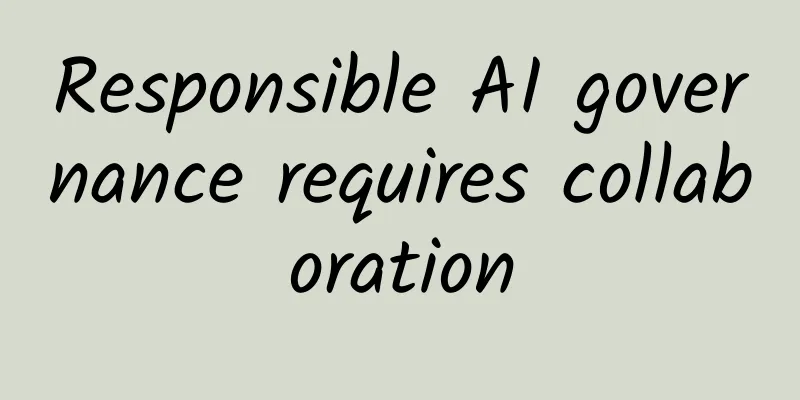Responsible AI governance requires collaboration

We are gathered at a critical moment in history. Human progress is increasingly intertwined with the influence of algorithms and networks, which affect our lives. The rise of artificial intelligence is not only a technological leap, but also a profound transformation, with both opportunities and challenges. Therefore, collective oversight of advanced AI is not only beneficial, but imperative. Countries are moving quickly to regulate AI and harness its potential to promote social and economic transformation in order to reduce risks. The global situation is at a critical juncture, with a balance between the rapid development of AI technology and the urgent need for governance to guide this rapidly developing technology. Multi-party participation and cooperation guide the development of artificial intelligence In the past few months, the international cooperation agenda around AI has made important progress. The UK held its first AI Safety Summit , and 29 countries, including China, EU countries and the United States, signed the Bletchley Declaration , agreeing to work together to ensure that AI is designed and deployed in a responsible manner. The EU AI Act is in the final stages of negotiation and, once passed, will establish the most comprehensive framework applicable to the development and use of AI. The leaders of the Group of Seven agreed on international guiding principles on AI and a voluntary code of conduct for AI developers in the Hiroshima AI Process. The United Nations announced the establishment of a high-level advisory body on AI . In addition, US President Biden issued an Executive Order on Safe, Reliable and Trustworthy Artificial Intelligence , setting new standards for the safety and security of AI. However, while a declaration is necessary to raise awareness, it is not enough on its own. The real work lies in the subsequent actions. The World Economic Forum has launched the AI Governance Alliance for this purpose. The Alliance is composed of more than 200 influential people from industry, academia, civil society and government. Its purpose is not only to bring stakeholders together, but also to promote mutual commitments to take joint action on some of the most pressing issues in AI governance, including jointly finding cutting-edge preventive measures, protecting more AI systems, and promoting the application of cutting-edge knowledge of generative AI in all sectors and industries. Driven by its members, the Alliance aims to design, co-create and help a wide range of decision-makers around the world develop more adaptive and resilient forms of AI governance. From discussion to action Guided by the Forum’s multi-stakeholder approach, the World Economic Forum’s Centre for the Fourth Industrial Revolution (C4IR) has successfully held the Leaders’ Summit on Responsible AI , released the Presidio Recommendations and launched the Alliance on AI Governance . Building on these developments, this week the Forum hosted the AI Governance Summit . More than 180 leaders in the field of AI came together to exchange knowledge, discuss strategies and develop practical plans at a fair and inclusive summit. The summit agenda includes a plenary outlook session on key AI topics, a global dialogue on immediate applications of generative AI, a strategic session to advance initiatives and their impact, and workshops to further advance existing workstreams of the Alliance. The insights and recommendations raised at these meetings will not only set a precedent in important discussions and provide real momentum for responsible AI development, but will also encourage action by world leaders and organizations. These important outcomes will influence the future work of the Forum’s AI Governance Alliance and greatly advance the relevant dialogue ahead of the 2024 World Economic Forum Annual Meeting (“Winter Davos”), where AI will also be a focus of discussion. Now is the time to act In the evolving field of artificial intelligence, the urgency of promoting responsible AI development has never been greater. Therefore, the call to action is clear: the time has come to guide AI towards ethical and inclusive progress that enhances the well-being of society through global cooperation, innovation and practical measures. The Forum and the AI Governance Alliance heed this call and are committed to working with the international community to jointly confront the challenges and opportunities of this rapidly evolving technology. Author of this article: Li Xiang, Member of the Executive Committee of the World Economic Forum, Head of Artificial Intelligence, Data and Metaverse This article originally appeared on the World Economic Forum's Agenda blog |
>>: The world's thinnest 6.1mm iPad: first review after Apple's new iPad launch
Recommend
Social media operation: How to use social media to increase followers accurately?
Community economy has become a trend. Whoever has...
What are electronic anklets? How do they work?
Meng Wanzhou finally returned to China after bein...
Growth Hacker Methodology: How to find growth points?
Every team is pursuing growth, but how is growth ...
Weilai Li Bin sent an internal letter, in order to improve operational efficiency, 1,200 employees will be laid off
On August 22, Li Bin, founder, chairman and CEO o...
Correctly understanding sleep and snoring can help us sleep better!
Author: Wu Xiaoli, deputy chief physician of Chin...
How to analyze user thinking and do good brand marketing?
In the past, everyone has always talked about tra...
I didn't die in the tiger's mouth, thanks to this thing in the zoo
Key Points ★ Wildlife parks often use concealed i...
[Smart Farmers] Wild carp are also endangered! Wild forms of aquatic species are under threat
Editor’s Note: The report of the 20th CPC Nationa...
Detailed explanation of WeChat business agent model | 3 core agent models revealed
I have to say that’s a great question and one I’m...
Content Marketing: From Planting Grass to Building Brand IP
What exactly are we talking about when we talk ab...
Hisense's Liu Hongxin: Never rejected OLED, but more optimistic about laser display technology
Yesterday, we published the article "30,000 ...
I've never seen such a thing before! How can this lamp last for 150 years?
You must have heard of the existence of "ete...
In this year of the knowledge economy, content started to make money, but is it a sustainable business?
On December 4, 2016, Himalaya FM's first &quo...
SAIC's rejection of Huawei is the result of the last stubbornness of traditional car companies and their final struggle with technology giants
The incident of SAIC rejecting Huawei is still fe...
The most comprehensive guide to information flow advertising, everything you want to know is here!
Advertising in the new media era is truly pervasi...









